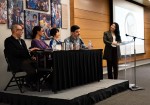“The Line Becomes a River: Dispatches from the Border” was chosen as UCLA’s 2018-2019 common book in July. In months prior, thousands of immigrant children had been separated from their parents at the United States-Mexico border.
The campus-wide committee responsible for the selection had no idea that months later, just before the launch of campus programming for the common book, the federal government would shut down for over a month over funding for a proposed border wall.
The memoir details author Francisco Cantú’s experience as a U.S. Border Patrol agent from 2008 to 2012. In the book, he said he reflects on his time as a part of a system that has normalized violence. This past week, UCLA hosted two events with Cantú – a book talk Tuesday and a panel Wednesday, featuring members from the legal community and UCLA faculty to discuss immigration. The discussions sought to connect Cantú’s work with the ongoing developments in immigration, said La’Tonya Rease Miles, director of UCLA First Year Experience.
“We hope that the book increases peoples’ awareness of the border and humanizes that experience, I would say in a way that perhaps our media is not right now,” Miles said. “That really was the goal there, recognizing that not everyone really knows what that experience was like.”
Cantú said he initially joined border patrol because he believed he could observe and change the system from the inside or use the insight for a future career in law or politics. Instead, he found himself deeply affected by the way in which he internalized the workings of the system, and felt the need to write about his experience to help him process the experience. Cantú felt the need to push back on the idea that one can step into institutions that have normalized violence and emerge unscathed, he said.
Cantú finished his first draft of the book prior to the 2016 election, which completely changed the context of his story. Initially, he thought that “The Line Becomes a River” would serve as a testament to an uglier time in history, he said. Instead, Donald Trump won the election after running a campaign kick-started by anti-immigrant rhetoric, and immigration became a central issue in the political discourse.
“Families have been separated and unjustly detained and children have been detained in a lot of the same ways under prior administrations … but I think the biggest thing is the rhetoric that’s being used is more dehumanizing than ever before,” Cantú said.
Wednesday’s panel began with a request that students voice their opinion respectfully. Miles reminded students that if their protest interrupted the event, they would be asked to desist, and if they continued, they would be escorted out and potentially arrested. At past events, activists have criticized Cantú for joining border patrol and being complicit in a system seen by many as deeply harmful to immigrant communities. However, no such protests occurred at Wednesday’s event.
Panelists discussed the varying rhetoric surrounding immigration. UCLA professor of Chicana and Chicano studies and urban planning Abel Valenzuela spoke about the vitriol directed at undocumented individuals by the administration, while UCLA professor of history and African-American studies Kelly Lytle Hernández recounted an interview she had with the BBC that morning, in which she was repeatedly asked about the idea that America is a nation of immigrants. That notion is part of a mythology, she said – rather than a nation of immigrants, the U.S. has always been a nation of settlers.
“We began with native removal, we developed through black enslavement and we have defined ourselves through mass deportation,” Lytle Hernández said. “This is a fundamental structure in the creation and the peopling of the United States.”
In discussing the continuing structure of immigration, lawyer and panelist Angeline Chen talked about her continuing efforts to help families and children reunite. Cantú offered his own insight, suggesting the failings of the system were no accident.
“(It’s easy to think) the system is stressed and that’s why people are falling through the cracks or look at all of these unintended policy consequences,” Cantú said. “But I think from what I’ve seen … the system is perfectly happy to function this way and that there is not impetus to change it.”
However, despite the broad challenges in helping those ensnared in the immigration system, panelists offered some hope for students asking how they could help. Lytle Hernández emphasized the importance of activist work, no matter how limited in reach.
“Remember that it was a bus boycott in Montgomery, Alabama, that helped unravel Jim Crow America,” Lytle Hernández said. “The discreteness of whatever issue you’re dealing with might exactly be its power, and don’t dismiss it as ‘This is too small, I’m not doing enough.’ … With all these little points of light, we’re going to push in the right direction.”
